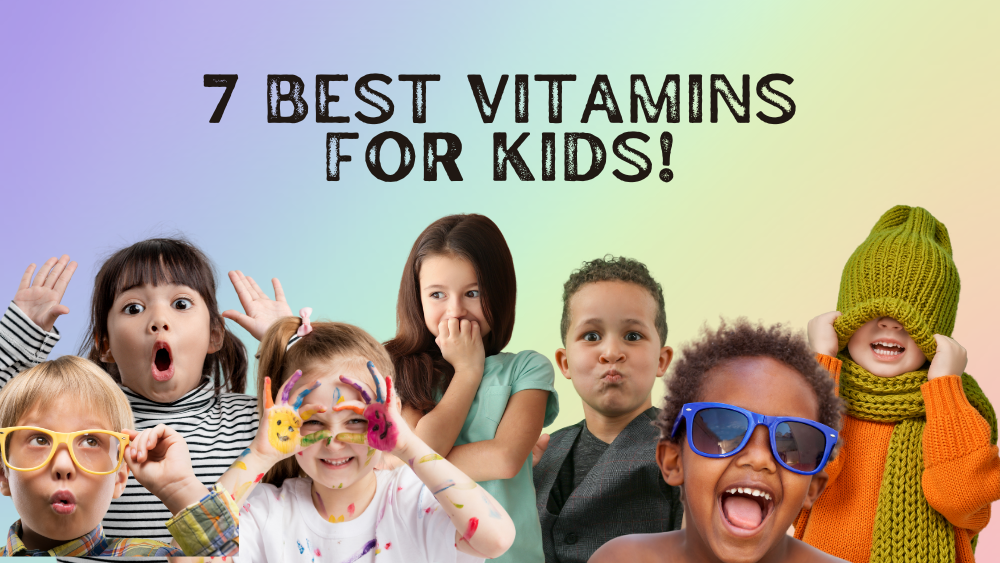Vitamins are important for children's growth and health. They help the body work well by supporting things like energy, the immune system, strong bones, and mental focus.
Most of the time, a balanced diet gives children the vitamins they need. However, some vitamins are especially important and may need extra attention.
Parents should make sure their kids eat a variety of foods to get the vitamins they need. If needed, supplements can be used with advice from a doctor.
Why Vitamins Are Important for Kids
- Supports Growth and Development: Essential vitamins help kids grow properly. They promote strong bones, muscles, skin, and eyes. For example, vitamin A helps with eye health, while B vitamins support cell metabolism and overall growth.
- • Boosts Immunity: Some vitamins, like C and E, act as antioxidants that help kids' immune systems fight infections. They protect against illnesses like the flu and colds, keeping kids healthier overall.
- • Aids Cognitive Function: Vitamins are important for a child's brain development. Vitamins like B12 help improve memory and thinking skills, which can boost academic performance.
- Regulates Energy Levels: Some vitamins help the body's metabolism, keeping your child's energy balanced throughout the day. This helps them stay alert and active for both studying and play.
Vitamin A
Vitamin A is important for good vision, boosting immunity, and helping children grow and develop. It also supports healthy skin, bones, and tissues.
Foods high in vitamin A include dark leafy greens, sweet potatoes, spinach, carrots, and colorful fruits and vegetables. Animal-based foods like fish, liver, dairy products, eggs, and fortified cereals also provide vitamin A.
Vitamin C
Vitamin C, often called an immunity booster, is important for a child's growth. It helps grow and maintain body tissues like skin, blood vessels, and ligaments, supporting overall healing. Vitamin C also improves iron absorption, which helps carry oxygen in the body and supports red blood cell production. Oranges, lemons, and other citrus fruits, as well as bell peppers, strawberries, and more, are great examples of foods that can help meet nutritional needs.
Vitamin D
Vitamin D is essential for kids' growth and development. It helps the body absorb calcium, which is needed for strong teeth and bones during active growth. Besides supporting bone health, vitamin D also plays an important role in the immune system, helping regulate cells that fight infections.
Children can meet their vitamin D needs in several ways. One of the main sources is sunlight, as the body makes vitamin D when the skin is exposed to moderate sunlight, especially between mid-morning and early afternoon. Fatty fish like salmon, mackerel, and tuna, as well as fortified milk and dairy products like cheese and yogurt, are also great sources of the "sunshine vitamin" for a balanced diet.
Vitamin E
Vitamin E is important for children's growth and development. It acts as an antioxidant, protecting body cells from damage caused by free radicals, which are harmful substances produced when food is turned into energy or from exposure to things like tobacco smoke.
Vitamin E is found in many foods, so supplements are usually not needed unless there are specific health issues. Good sources include nuts like sunflower seeds, almonds, and hazelnuts, which provide plenty of nutrients. Green leafy vegetables, such as spinach and broccoli, are also high in vitamin E.
Vitamin B Complex (B12, B6, etc.)
The vitamin B complex, which includes B12 and B6, is important for a child's development. These vitamins help keep the skin and eyes healthy and support the normal function of the nervous system.
More importantly, it is necessary for the production of energy, which converts food into fuel and helps children become more active while feeling less exhausted. Sufficient amounts of these vitamins have been linked to improved memory and focus, which support adequate academic performance and cognitive development.
Calcium
Calcium is crucial for a child's growth since healthy bones and teeth are the foundation of physical well-being.
Milk, cheese, and yogurt provide a large portion of your child's nutritional needs because they are nutrient-rich and easily absorbed by the body. Fortified foods like certain breakfast cereals and soy drinks are also good sources. Leafy greens are important too, as they are natural stores of nutrients.
Iron
Iron is an important mineral for a child's growth. It helps carry oxygen throughout the body and supports the production of red blood cells. Having enough iron also helps with energy, focus, and overall brain function.
Ultimately
Essential vitamins and minerals are crucial for a child's growth and development. They not only support physical health but also boost mental and immune strength, which are key for a healthy child. Most of the nutrients the body needs can be found in many foods, so a balanced diet is important. However, supplementation may be helpful under supervision, especially during growth spurts or specific health needs. Ultimately, achieving good health requires flexible and adaptable approaches.

